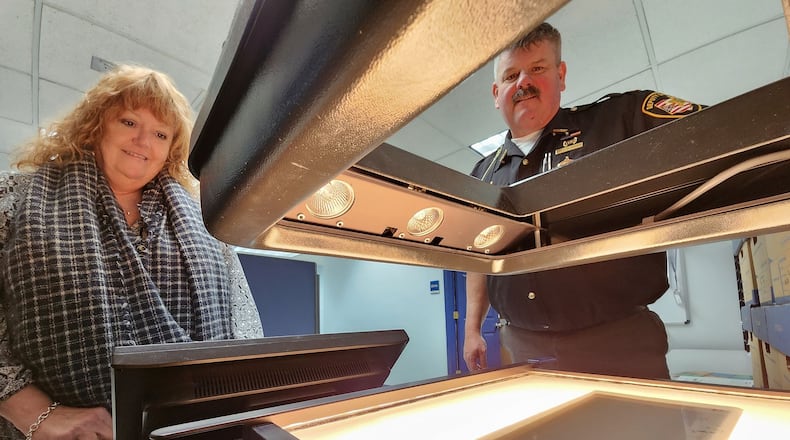But one smuggling method as old as jails themselves — the U.S. Postal Service — has been all but been eliminated at the facility on Hanover Street in Hamilton.
Inmates no longer receive actual letters, but they still get the message.
Pieces of mail have been jail staff inspected for years, but smugglers have gotten more creative, so now inmates receive a scanned copy of all correspondence.
“It was so prevalent, they were dissolving drugs, putting it on paper then drying it out, and the (inmate) reconstituted it,” Butler County Chief Deputy Anthony Dwyer said, noting suboxone strips were especially easy to hide in envelope adhesive. “It was such a horrific problem with trying to control overdoses that we no longer allow regular mail.”
The mail is sliced open, inspected, digitized and the inmate gets the scanned copy.
“It has been extremely effective at knocking the contraband way down,” Dwyer said. An outside company conducts the scanning operation that was paid for along with the jail inmate system contract and a grant.
Correspondence from an attorney to an inmate is treated differently. The scanner is taken to the jail pod, the mail is opened in the presence of the inmate and staff then scanned.
Capt. Nick Fisher, jail warden, estimates the facility receives about 1,000 pieces of mail a week.
“Very creative,” is the way Fisher described drug smuggling in letters until the scanning operation began about a year ago.
Sheriff Richard Jones, who had a career at Lebanon Correctional Institution before coming to the sheriff’s office, said, “Everywhere we tried to stop it, it would just come in another way. This has pretty much put a stop to it through the mail.”
But that doesn’t mean smuggling has stopped. Last week a woman was arrested for allegedly using the “hot trash” approach by dropping a Fixodent tube stuffed with suboxone in the lobby where an inmate working in facility would have been able to retrieve it.
“We call that hot trash. They bring stuff up and they drop it off somewhere around the a jail, and prisoners pick it up while working or being taken to court and smuggle it in,” Jones said. “It is a struggle. You have to evolve. I’ve been fighting contraband coming in since 1976 from my time at the prison to here. The scanned letters is really 100 percent stopped it with the mail.”
Contraband has been found in dirty diapers taken from the public restrooms and dropped in a dirty mop bucket that resurfaces when the water is emptied.
A specially trained K-9 Thunder sniffs out drugs, tobacco and electronics and phones, which are all contraband, during frequent cell searches.
In 2017, the jail also installed body scanner for those being booked into the facility. It catches smuggling on the body of a new inmate and also serves as a deterrent.
The scanner has also been used to help find items that corrections officers believe have already been smuggled into the jail.
“If we get information something had been smuggled in and we can identify a group of inmates, we will scan those inmates to see if they have contraband on them,” Dwyer said.
About the Author


